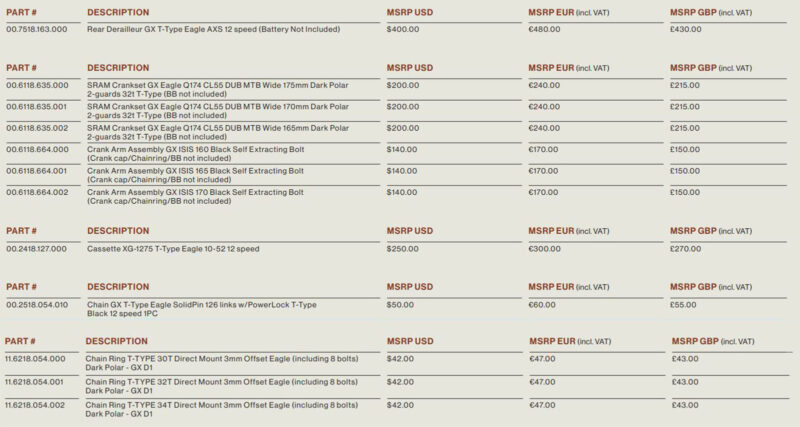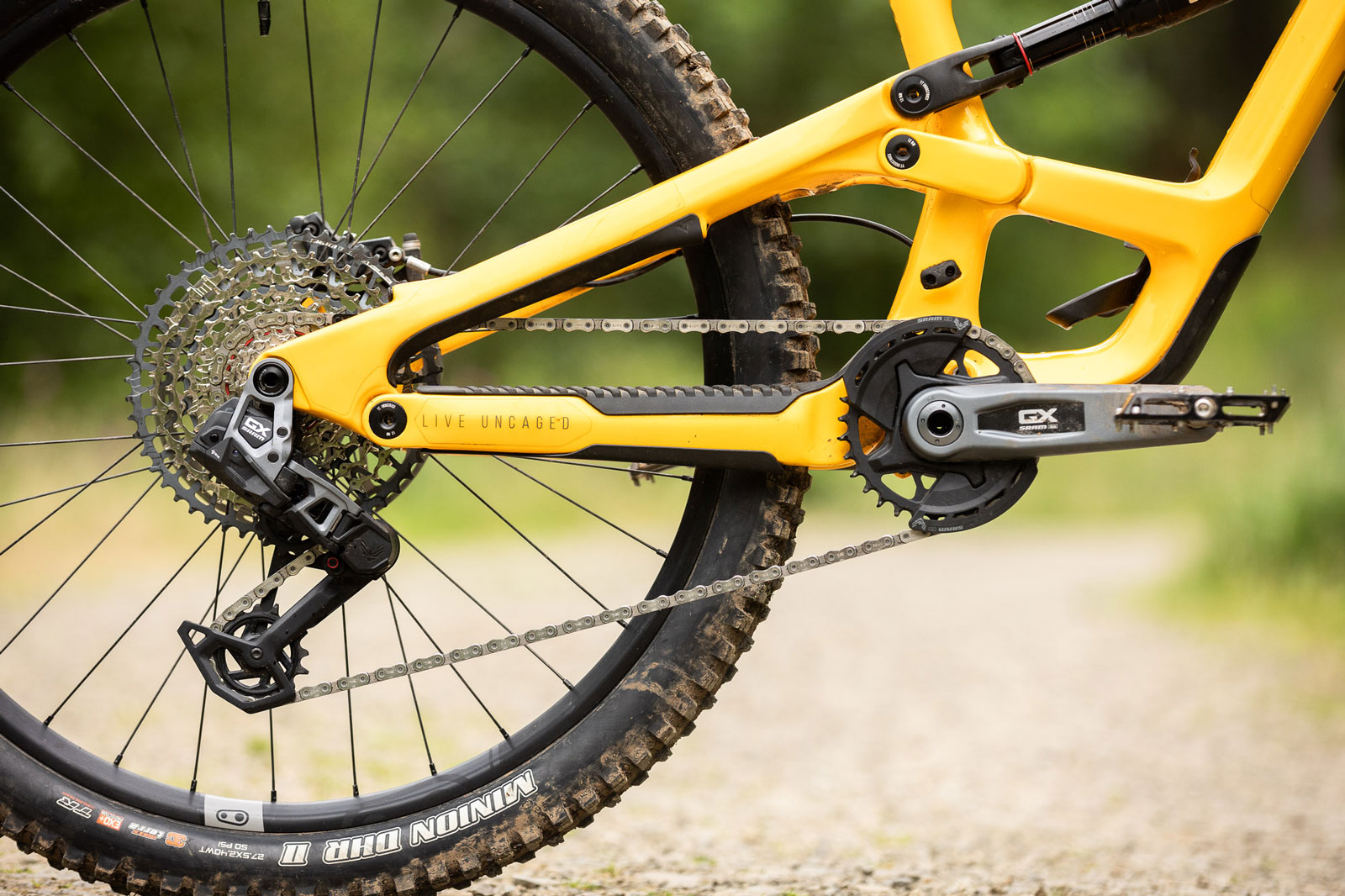SRAM has improved the affordability of the all-new Transmission, bringing the price of entry down to $1,099 USD with the launch of the GX T-Type Eagle. And, so far, it’s excellent. We are pleased to report the vast majority of technology debuted on the $2,199 XX SL, $2,049 XX, and $1,599 XO models earlier this year, does trickle down to the less expensive GX T-Type announced today.
Like those lighter, pricier options, the GX T-Type derailleur mounts directly to the hanger-less interface of all* frames that have a SRAM UDH dropout. This so-called Full Mount design mounts the derailleur to the axle, ensuring spacing is always spot-on, regardless of variations that may exist between manufacturers’ frames and dropouts. Because of that mounting style, SRAM has been able to create a derailleur that has no need for upper and lower limit screws, or even a B-screw for dialing in chain gap.
Tyler has previously covered the SRAM Transmission in great detail – we direct you to that piece for a deep dive on exactly how it all works, and why they overhauled the mountain bike drivetrain in the first place.
Here, we have a detailed account of how the new GX Eagle T-Type differs to the higher-end offerings, with the actual weights of all components. We look forward to providing a long-term review on the components, but for now, here are some comments on how the Transmission has performed on our first few rides.
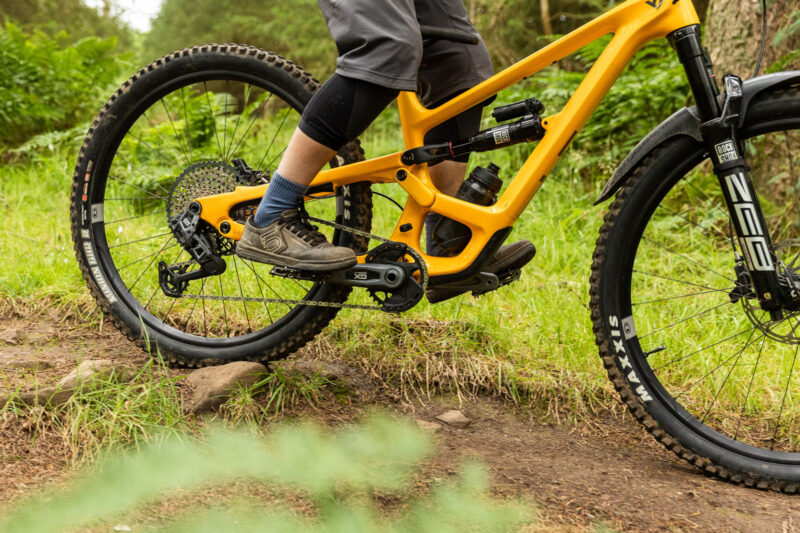
SRAM GX Eagle T-Type | An Overview
The benefits of Transmission over traditional drivetrains, both electronic and mechanical, are also relevant to the SRAM GX Eagle T-Type announced today. Along with the incredible ease of setup, with the aforementioned elimination of adjustment screws, it is claimed that the GX Transmission is every bit as crisp and precise as the other derailleurs in the Transmission family and that it:
- Performs shifts under high load
- Performs shifts quietly
- Tolerates side-on and frontal impacts, within reason
We are in the midst of testing these claims and have some experience to share from our first few rides below.
An important benefit of the GX T-Type derailleur is its serviceability. If, in the sad scenario your derailleur doesn’t tolerate the unintended abuse you send its way – during riding, crashing, transit, or otherwise – it is entirely possible that you won’t need to replace the whole thing. The two-piece outer link of the parallelogram, battery fastener, and pulley cage assembly with clutch are all replaceable – the latter in a super easy tool-free fashion. It simply twists off, so assuming the threads aren’t damaged during the offending incident, you can just screw on a new ($129 USD) cage.
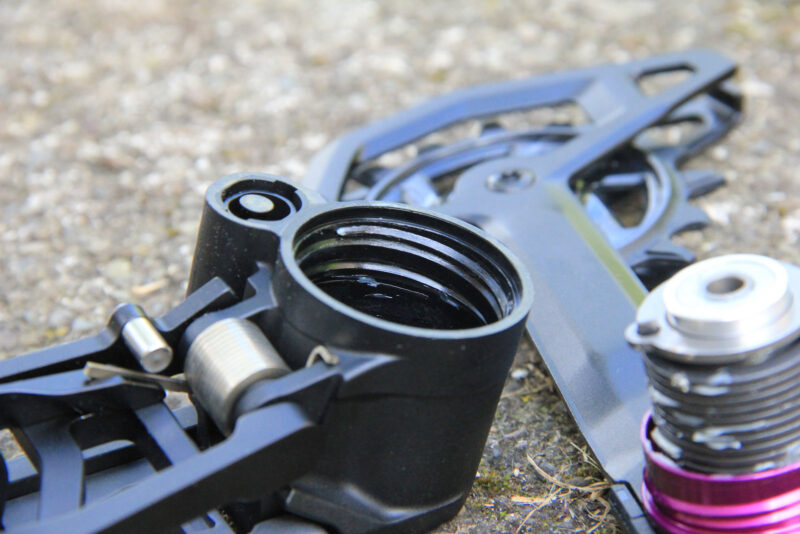
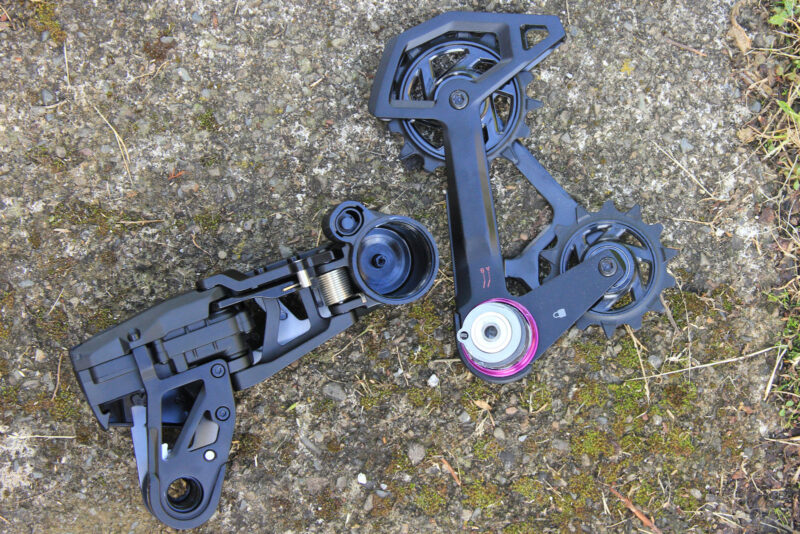
Even at the reduced price of $400 USD (the next most affordable one costs $550), that’s going to be a relief when you find your precious derailleur has been somewhat disassembled by a trailside object.
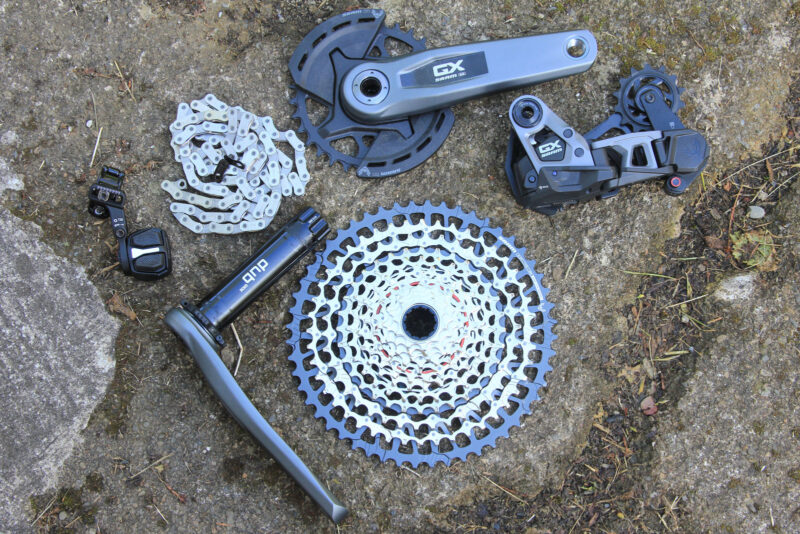
How is GX T-Type different from XO, XX, and XX SL T-Type?
As you move up the tiers of a given manufacturer’s drivetrain, the constituent components switch to lighter offerings, often with more features packed in that either improve performance or make the component more durable. The SRAM Transmission offerings are no different.
As such, the GX Eagle T-Type Transmission gets slightly heavier components, with the cranks and derailleur home to a distinct grey-ish Dark Polar finish that immediately sets them apart as belonging to this more affordable groupset. The good news is, if you’re buying a complete bike with the GX Eagle T-Type, some of its parts can be upgraded to the XO, XX, or even XX SL equivalents. Let’s dive into how each and every component of the GX T-Type Transmission differs from its higher-end counterpart. Starting with…
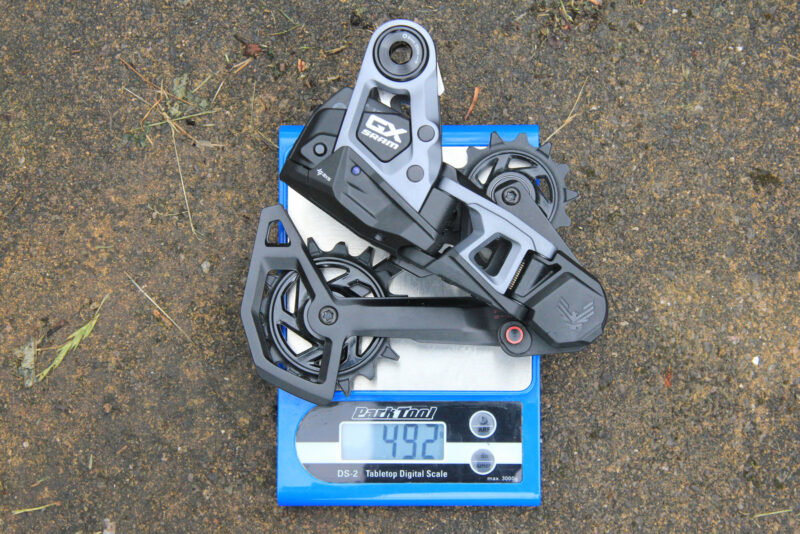
The SRAM GX Eagle T-Type Derailleur
At 492g (with battery) the GX T-Type derailleur is the heaviest of the lot, but not by much. It is just 18 grams heavier than the XO T-Type, and 48 grams heavier than the XX SL T-Type (we don’t have a weight for XX). The steel inner cage is largely responsible for that, with the higher-end cages made from lighter-weight aluminum.
Functionally, it is almost entirely equivalent to both, and it mounts to the hanger-less interface of the frame dropout in the very same way, requiring no post-install adjustments. However, we are told this one has a reconfigured gearbox. Just how it has been reconfigured, and why, we are waiting to learn more. It also houses the battery in a less vulnerable position, as compared to the battery location on the higher-end options.
Sadly, the Magic Pulley Wheel seen on the XX SL and XX T-Type Derailleurs is not present on the GX option. The lower pulley on the aforementioned is constructed of two parts that have the capacity to rotate independently to one another in the event that a stick gets stuck in the cage. That independent movement means that the chain can continue running through the derailleur regardless. On the GX T-Type, such an unfortunate event would cause the pulley, and the entire drivetrain, to grind to a halt.
*Earlier we said that the T-Type derailleurs can mount to any frame that runs a UDH dropout. There is only one exception that we are aware of; while the Hope HB916 does run a SRAM UDH, it is not compatible with T-Type derailleurs.
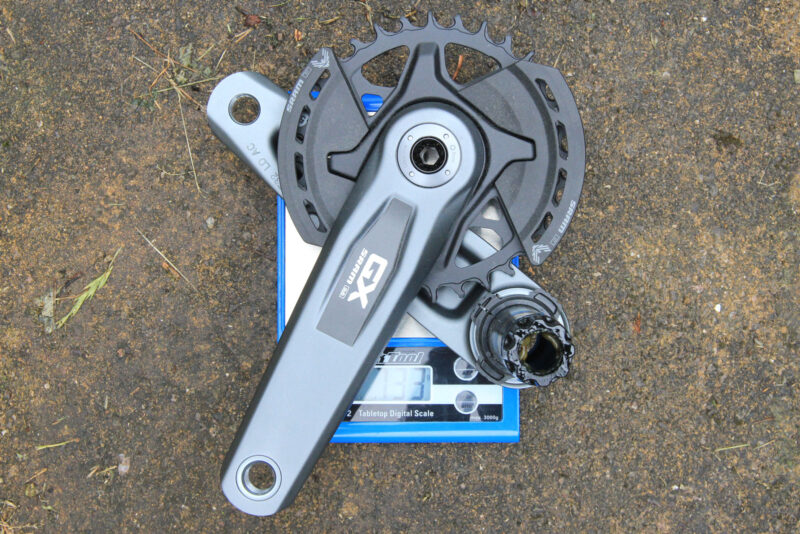
SRAM GX T-Type Crankset
Each group gets its own crankset, too. On our Park Tool scale, the 165mm GX T-Type crankset with DUB Wide spindle, 32T T-Type Chainring with two bash guards installed, weighed in at 733 grams. I don’t have a direct comparison with the other cranksets in the Transmission family but, for context, the 175mm version of the higher-end XO T-Type weighs 748 grams.
The crank arms themselves are made from a forged aluminum, and they lack the eye-catching cut-out portion seen on the XO offering. Meanwhile, the much lighter XX and XX SL T-Type cranks are of course made from carbon fiber.
Importantly, the GX crank is not available with a DUB-PWR spindle-based power meter but can be upgraded with a spider-based power meter. And, for anyone wanting to run Flight Attendant, the GX crank can accept the pedal sensor necessary for the system to function.
SRAM offers the GX T-Type cranks in 165mm, 170mm, and 175mm lengths, with 30T, 32T, and 34T chainring options. All the chainrings have a 3mm offset, producing a 55mm chainline which is said to deliver a more moderate chain angle with more precise shifting in a longer-lasting package (as compared to the 52mm chainline which has been the standard on Boost spacing frames for quite some time). That brings us to…
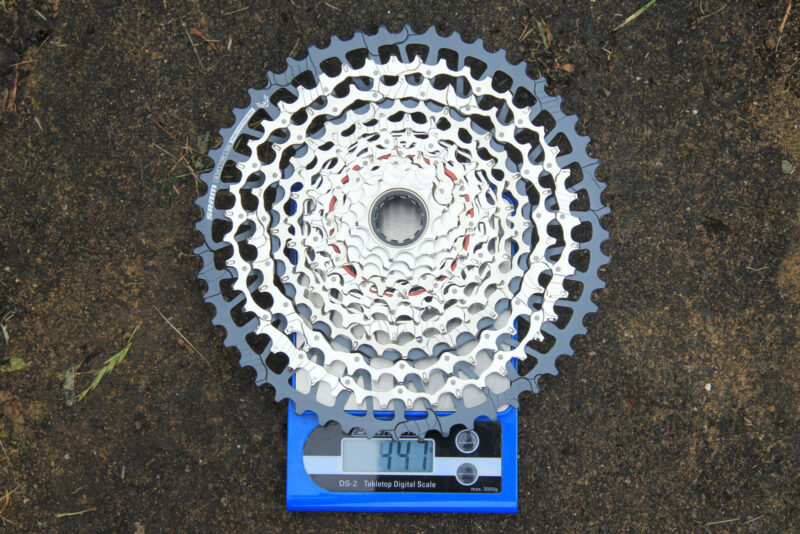
The GX Eagle Transmission Cassette
The 10-52T GX Eagle T-Type cassette weighs in at 447 grams; that’s 65 grams heavier than the XX equivalent, and 66 grams heavier than the XO equivalent. They each share a 10-12-14-16-18-21-24-28-32-38-44-52T cog stack with the long-standing X-SYNC tooth profiles, but they differ in their construction and materials.
The aforementioned higher-end options get a machined steel X-DOME design for the cluster, with stamped steel 38T and
44T cogs pinned to the lighter-weight aluminum 12th gear. Meanwhile, the GX T-Type cassette sees a Pindome design for gears 1-8, and a single-piece Mini-Cluster for gears 9-12. All are made from hardened steel, hence the additional weight and all get Nickel-plating which is said to make for a quieter and more durable cassette.
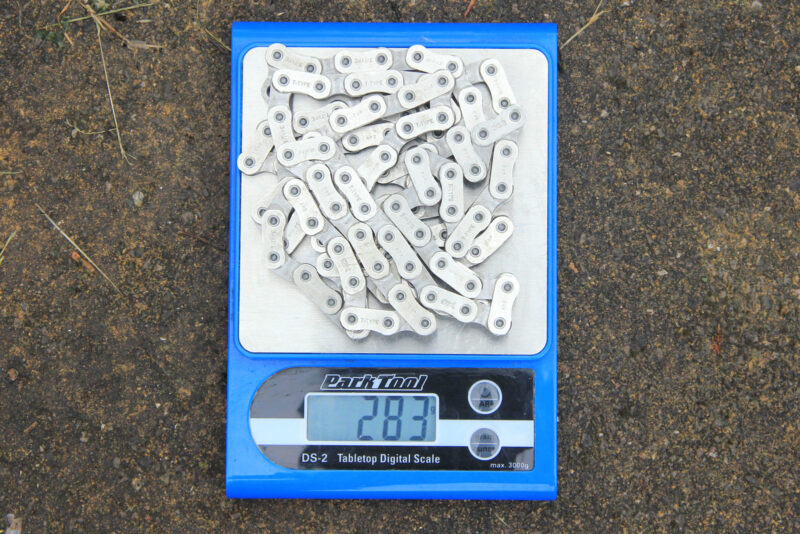
The Flat-Top GX Eagle T-Type Chain
Shipped with 126 links, the GX Eagle T-Type Flat-Top Chain weighs in at 283 grams; that’s just a single gram heavier than the electroless nickel-plated, PVD-coated chain of the XO Transmission group, which is said to have “unbelievable resistance to corrosion and wear”. The GX option doesn’t get the aggressive anti-corrosion PVD coating, but its links are nickel-coated to reduce premature wear.
While the GX and XO chains get solid pins, the XX gets hollow pins that reduce weight by just 9 grams. Meanwhile, the XX SL chain goes one better with hollow pins and cut-outs in the outer plates, bringing the weight down to just 264 grams. They also both see a hard chrome finish for even more durability.
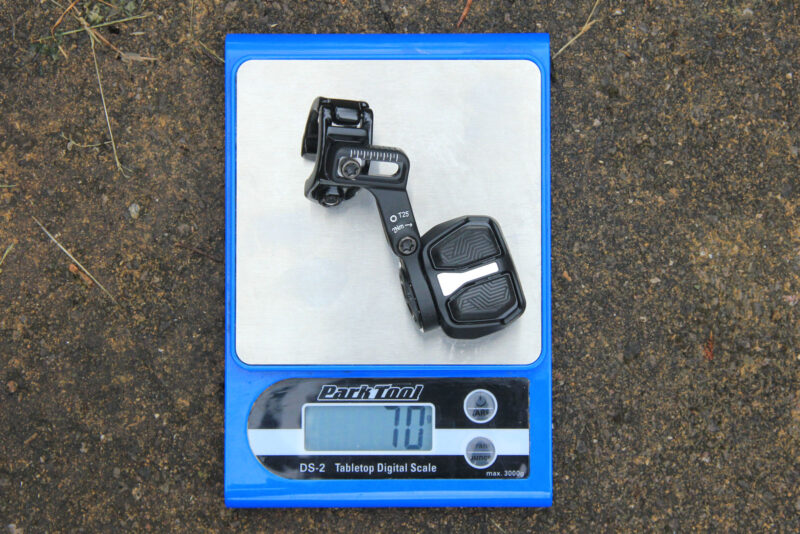
What about the Transmission Shifter?
For SRAM Transmission, there are two AXS Pod Controllers for shifting. The GX T-Type comes with the Standard Pod Controller that has non-customizable concave buttons. Meanwhile, the Ultimate Pod Controller comes with concave buttons installed, but these can be popped out and replaced with convex buttons, dependent on rider preference. On both variations, you can change which button performs a down-shift and which performs an up-shift by customizing in the AXS App.
On our Park Tool scale, the Ultimate Pod Shifter weighed in at 70 grams with its non-rechargeable CR 2032 battery and the MMX clamp (+ bolt) for pairing with SRAM brakes.

SRAM GX Eagle Transmission | Install & First Ride
I fitted the SRAM GX Eagle Transmission to a YT Capra MX, which is a UDH-compatible frame. That’s the only requirement for compatibility – the only exception being the Hope HB 916 which has UDH rear-end but is not compatible with T-Type derailleurs.
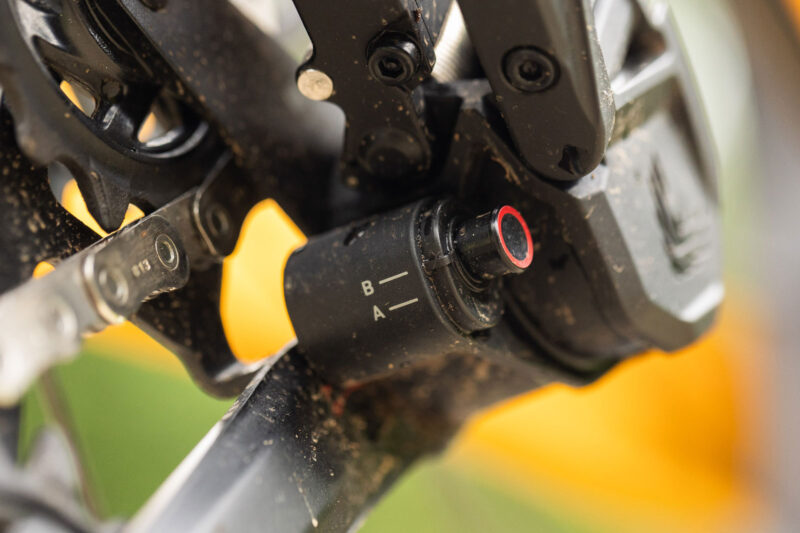
I digress. Following the below video from SRAM, installation of the T-Type derailleur went swimmingly. Inputting info on your frame model, frame size, flip-chip position, and chainring size into the AXS App (or this calculator), gets you the specific chain length required, and the specific setup cog, and it tells you to use either the A or B position for the setup key on the derailleur.
SRAM has done a great job on communication around T-Type installation, so go ahead and follow the instructions to the letter. They say it in the video, but I’m going to say it again here: care should be taken to tighten, loosen, and re-tighten the derailleur and axle in the order instructed in the video.
As you’ll see, the rear axle is the final component to be tightened to the manufacturer’s torque. Prior to this, you’ll have bolted the T-Type derailleur’s full mount portion to the dropout, ensuring that the line on the knurled ring (silver) lines up with the line on the inboard arm of the full mount.
And, you’ll have tightened it to the 35 Nm specified. SRAM tell us that some of their first production models include a mounting bolt marked with a 25 Nm torque specification – this is not correct. Go ahead and torque it to 35 Nm – SRAM says it helps the Transmission have a lower probability of losing chain tension.
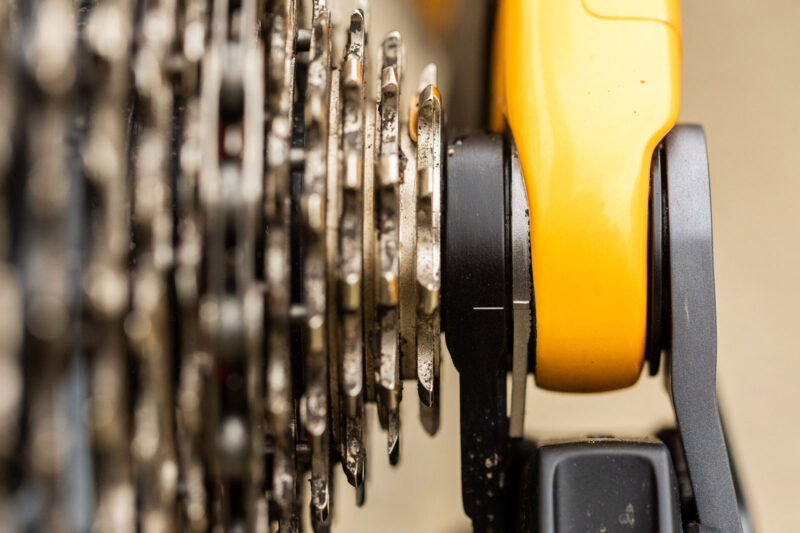
Like the 12-speed GX AXS group this GX T-Type replaced (on the YT Capra Core 3), there is scope for micro-adjustments after installation, allowing you to move the derailleur inboard or outboard at 0.2mm increments. Our newly-installed Transmission does shift a little roughly in the stand, and one might be tempted to fine-tune the derailleur position at this stage. Hold off doing so. Under sag, the chain gap between the upper pulley and cassette increases, reducing noise.
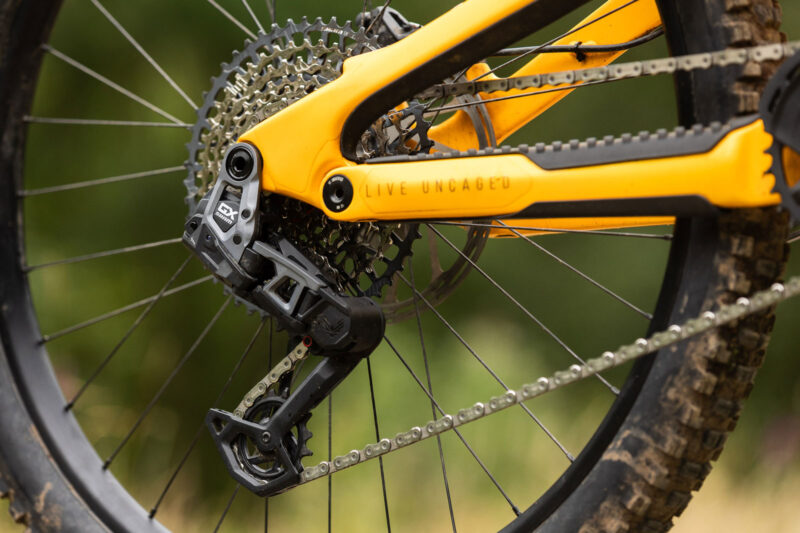
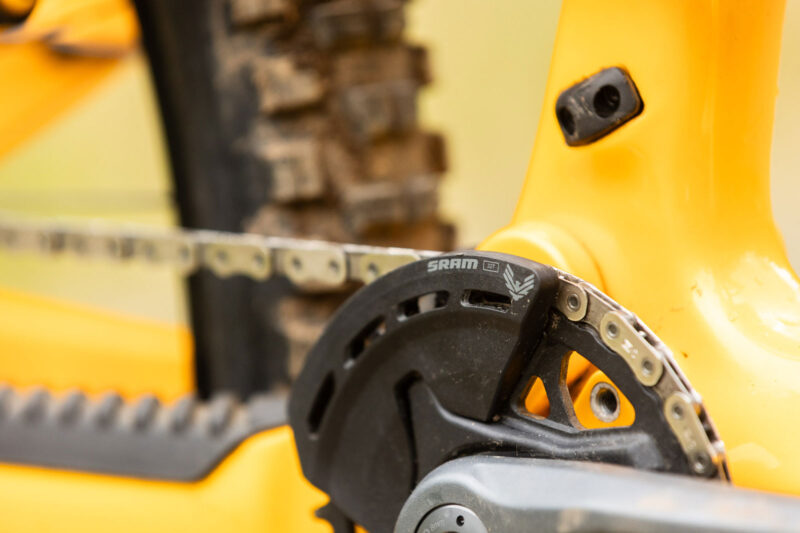
By the way, whenever you do remove the rear wheel for whatever reason, you might notice some lateral play in the derailleur at the point where the full mount hangs off the dropout. This was the case on our setup with the YT. Chris Mandell of SRAM reassures us this is to be expected, as the derailleur is actually mounted on the rear axle. So, without it, it sort of just hangs there, and it is possible to rotate it backward (clockwise) even when the bolt is torqued to 35 Nm.
GX T-Type Riding Impressions
Shifting while riding was perfect right off the bat, and there was no need to make use of the micro-adjustment feature. It’s not silent, but it is very quiet most of the time. Pedaling up technical climbs, I did not need to back off in order to shift. The derailleur transfers the chain onto its neighboring cog with no hesitation, regardless of how much load I was able to apply to the chain.

The only scenario in which I am able to force a big clanging noise is when shifting shortly after pedaling off from stopped, up a hill, with the chain in one of the smaller descending sprockets. That said, the derailleur still performs the shift, it just doesn’t sound too healthy while it does it.
I really like the tactility of the Pod Controller buttons for shifting. While there’s no real “throw” as such, the buttons of the Pod Controller compress a little further than the buttons of the GX AXS Rocker that gave way to it. More force is required, delivering way more positive feedback through your thumb to reassure you that the command has been sent.
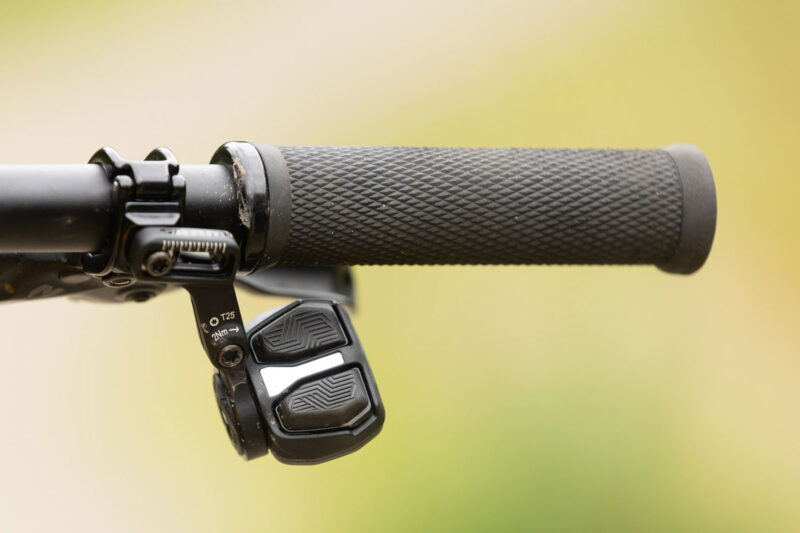
Credit: Finlay Anderson
The adjustability of the Pod Controller is very good; while there is some left-right adjustment available at the bar clamp, you can also adjust the rotation of the Pod itself to give you the best angle for your hand position. I would say, though, I do find the buttons are a little bit too close together, and I haven’t yet developed the muscle memory of where each one is. I’m sure it will come in time, but it hasn’t been super easy to just smash down on the correct button in the heat of a fast descent.
On the Ultimate Pod Controller shown here, you can pop out these concave buttons for convex ones, which could go a long way to helping the rider know which button they are pressing. If I had the convex buttons to hand, I’d probably switch out the lower one for a convex one to further help differentiate them on the trail.
There is another option here if you are running a second Pod Controller on the left to operate Flight Attendant suspension or an AXS Reverb dropper. You can program it such that one of the buttons shifts the derailleur. For example, you can configure it so that the top button actuates your dropper seat post, while the bottom button shifts the derailleur to a larger cog. Certainly, it makes sense to have control over both of those functions on the same side of the bar, especially when you hit a surprise incline mid-stage of an enduro race.

Credit: Finlay Anderson
So far, i’ve had only three short rides over which to test the GX T-Type, and so far it has been flawless. It is much quieter while descending than the GX AXS derailleur it replaced, indicative of a more efficient, well-damped clutch mechanism controlling cage movement.
I am pleased to report zero dropped chains, and still, I see no need to make any of those micro-adjustments. The derailleur’s position hasn’t moved at all; chain tension seems unchanged and the marker on the knurled ring still lines up with its corresponding marker on the inboard arm of the full mount.
I don’t believe I have smashed the derailleur into any trail-side objects yet, but plenty of opportunity lies ahead. I look forward to bringing you a long-term review of the GX Eagle T-Type.
Can you Combine SRAM GX T-Type Derailleur & Cassette with a Road Crankset?
The gravel contingent may well be wondering if they can mullet the GX T-Type with a Road Crankset. The answer is, yes! So long as your gravel bike runs a UDH dropout, providing that all-important hanger-less interface.
SRAM 1x AXS Road chainrings are compatible with T-Type chains. For the best chainline, you must use the wide version of the Road 12-speed crankset and DUB bottom bracket.
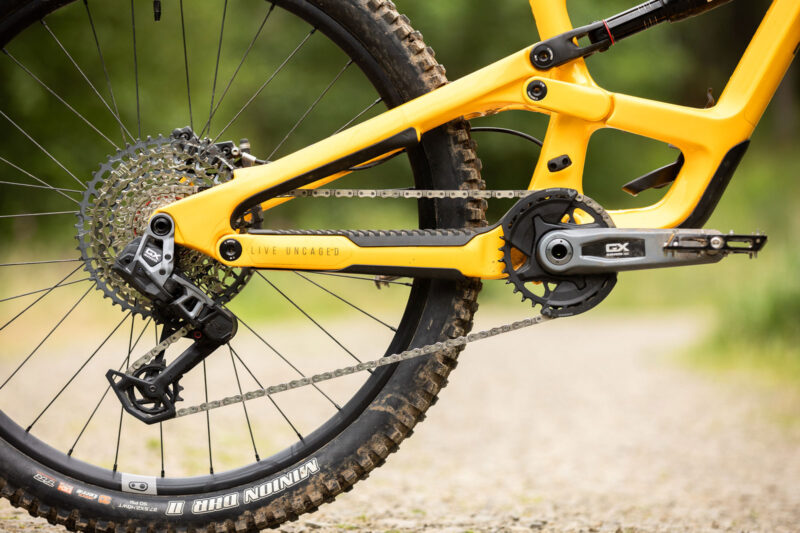
Pricing & Availability (+ Replacement Parts)
The complete SRAM GX Transmission, with 165mm, 170mm, or 175mm cranks, has an MSRP of $1,099 / 1,300 € /£1,180. That is $500 cheaper than the XO T-Type, $950 cheaper than the XX, and $1,100 cheaper than the top-of-the-range XX SL.
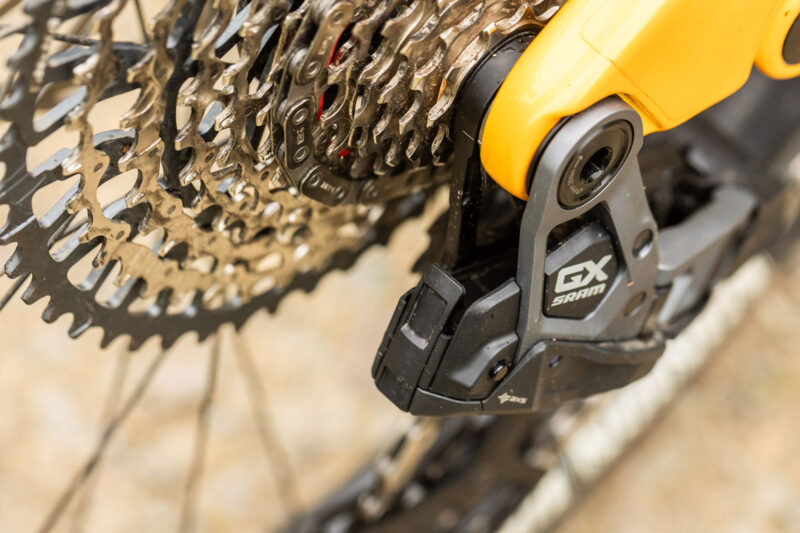
Pricing for the individual components can be seen in the image below. The cost of replacement parts is as follows:
- Battery fastener – $15 USD /16 € / £15
- GX T-Type cage assembly, including pulley wheels, cage, and clutch – $129 USD / 139 € / £125
- Full Mount Bolt, including frame bushing, knurled ring, and derailleur mounting bolt – $63 USD / 70 € / £62 GBP
- Outer parallelogram/skid plate assembly, including new mounting hardware – $22 USD / 24 € / £21 GBP
